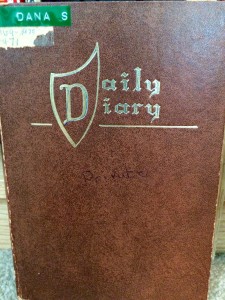 Later, when I got my Smith-Corona for Christmas of 1972 and learned to type, I found that I could more quickly capture my thoughts and emotions, which by now were gushing like torrents. I looked forward to that private period before bedtime, when I would sit in my room uninterrupted and bare my soul. (Today this is known as journaling and people get rich writing books and teaching seminars on how to do it.) I listened to my records as I wrote, and began each entry with a song lyric, like this one that expressed my adolescent confusion:
Later, when I got my Smith-Corona for Christmas of 1972 and learned to type, I found that I could more quickly capture my thoughts and emotions, which by now were gushing like torrents. I looked forward to that private period before bedtime, when I would sit in my room uninterrupted and bare my soul. (Today this is known as journaling and people get rich writing books and teaching seminars on how to do it.) I listened to my records as I wrote, and began each entry with a song lyric, like this one that expressed my adolescent confusion:
January 30, 1977
Wake up late without a smile
Telephone rings
You run like a child
On the street, into the day
The people I meet
Have nothing to say
–“Soul of the Sea” by Ann and Nancy Wilson of Heart, 1976
Yes, I related to Anne. We both had dark hair and eyes. We were both yearning to be free. We both wrote as a form of escape and self-therapy. And we seemed to have the same character; from all I’ve read, she was outspoken, opinionated, moody, and high-spirited. In other words, quite a handful, just like me.
And we were soul mates. Anne’s diary entry from April 5, 1944, completely captures the dreams and doubts that consumed me as a 13-year-old. It’s as if I’d written every word of it myself.
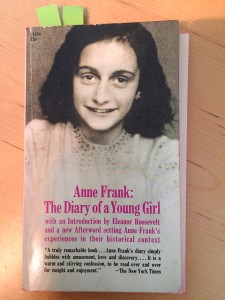 I finally realized that I must do my schoolwork to keep from being ignorant, to get on in life, to become a journalist, because that’s what I want! I know I can write…but it remains to be seen whether I really have talent…
I finally realized that I must do my schoolwork to keep from being ignorant, to get on in life, to become a journalist, because that’s what I want! I know I can write…but it remains to be seen whether I really have talent…
And if I don’t have the talent to write books or newspaper articles, I can always write for myself. But I want to achieve more than that. I can’t imagine living like Mother, Mrs. van Daan and all the women who go about their work and are then forgotten. I need to have something besides a husband and children to devote myself to! …
I want to be useful or bring enjoyment to all people, even those I’ve never met. I want to go on living even after my death! And that’s why I’m so grateful to God for having given me this gift, which I can use to develop myself and to express all that’s inside me!
When I write I can shake off all my cares. My sorrow disappears, my spirits are revived! But, and that’s a big question, will I ever be able to write something great, will I ever become a journalist or a writer?
It’s the question she poses in that last line that I still ponder daily: will I ever be able to write something great? I know that’s an ego-driven preoccupation, but aren’t all writers egocentric in their need to be read, in their desire (in Anne’s words), to be useful or bring enjoyment to all people? Today, I still have the ghost of the writer’s self-doubt that plagued Anne. Every time I finish an article for this blog, the worries begin: What if I can’t write another one? What if I run out of ideas or my abilities dry up? This isn’t necessarily a bad thing. It keeps me working and striving to improve. Bruce Springsteen has expressed these same sentiments time and again. “Have iron-clad confidence; but doubt — it keeps you awake and alert,” he once told a group of aspiring musicians.
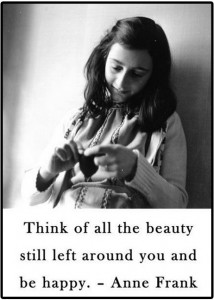 My teenage diary was filled with expressions of happiness and pride over incidents ranging from special (Mr. S. told me to keep writing and I’ll be published by the time I’m 25! – March 10, 1976) to superficial (today I wore my green corduroy outfit; it always brings me luck! – December 15, 1973).
My teenage diary was filled with expressions of happiness and pride over incidents ranging from special (Mr. S. told me to keep writing and I’ll be published by the time I’m 25! – March 10, 1976) to superficial (today I wore my green corduroy outfit; it always brings me luck! – December 15, 1973).
And more often than not, my pages were full of hopeless, ugly thoughts (I really don’t see that anything good will ever, ever happen to me in the future – February 3, 1977). Today, reading those rants of self pity, I feel foolish as I compare my silly problems to those of Anne Frank’s. The world was crumbling around her, and still she managed to embrace a glimmer of hope. On July 15, 1944, she wrote:
It’s a wonder I haven’t abandoned all my ideals, they seem so absurd and impractical. Yet I cling to them because I still believe, in spite of everything, that people are truly good at heart. It’s utterly impossible for me to build my life on a foundation of chaos, suffering and death. I see the world being slowly transformed into a wilderness, I hear the approaching thunder that, one day, will destroy us too, I feel the suffering of millions. And yet, when I look up at the sky, I somehow feel that everything will change for the better, that this cruelty too shall end, that peace and tranquility will return once more.
Anne continued to write in her diary until the day she and her family were seized from their hideout in Amsterdam and sent to the Nazi death camps: her father Otto to Auschwitz and she and her sister and mother to the Liebau camp and later to Bergen-Belsen, where she died of typhus a few months before British soldiers liberated the camp in April 1945.
Like Anne, I will continue to write till my stoney end.
© Dana Spiardi, June 12, 2015
]]>
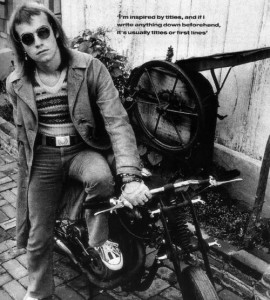
Bernie was no stranger to the slow, simple country life. He was born in a rural area in Lincolnshire, England – in a farmhouse that lacked electricity. Later, his father bought a run-down farm in the Lincolnshire village of Owmby-by-Spital. It was there that Bernie spent his days hitchhiking to dances, frequenting pubs and playing snooker. Boppin’ in the country, fishin’ in a stream — like the Honky Cat character he created.
His life changed forever in 1967 when he and Elton – unknown to one another – both answered a newspaper ad placed by a record label seeking new talent. Although neither artist passed the audition, Liberty Records’ A&R man Ray Williams put the two in contact, and they clicked. Bernie was 17 at the time. He’d end up following Elton down the yellow brick road to fame, but he’d never lose his memories of the family plow or the howling old owl in the woods.
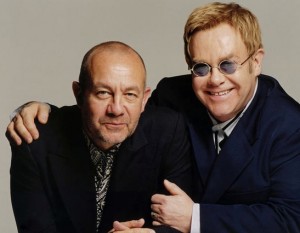 The two artists have collaborated on 30 albums through the years, but my favorites are the ones that evoke those idealized visions of an untamed, open-road America — the kind of place where we all picture ourselves rolling through the hay and running through the grass for hours. Your musical education won’t be complete until you’ve discovered the early gems — 11-17-70, Tumbleweed Connection, Madman Across the Water, and Honky Chateau – all released between 1970 and 1972. These works resonate with the beautiful sounds and images that formed everlasting grooves in my brain, many years ago.
The two artists have collaborated on 30 albums through the years, but my favorites are the ones that evoke those idealized visions of an untamed, open-road America — the kind of place where we all picture ourselves rolling through the hay and running through the grass for hours. Your musical education won’t be complete until you’ve discovered the early gems — 11-17-70, Tumbleweed Connection, Madman Across the Water, and Honky Chateau – all released between 1970 and 1972. These works resonate with the beautiful sounds and images that formed everlasting grooves in my brain, many years ago.
Here’s a real American beauty: “Amoreena” from “Tumbleweed Connection:” This song was used in the opening credits of the film “Dog Day Afternoon.” It’s interesting that a song about rural life would kick off a movie about a city crime caper.
“You’ll pick rotten peaches for the rest of your life.” This song about life on a chain gang is from “Madman Across the Water.” The album features two of Elton’s most enduring songs, “Tiny Dancer” and Levon.” Interestingly, “Madman” was the lowest-charting album of his career.
This is a live version of one of Elton and Bernie’s loveliest creations:
© Dana Spiardi, May 22, 2015
]]>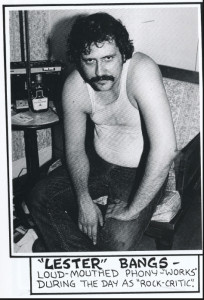 At one point in the interview, Lester said, “Hell, the only difference between you musicians and us rock writers is that people can see you doing what you do. I can’t go up in the street and say, ‘Hey, honey, dig my far-out John Lennon review,’ because she can say, ‘Kiss my ass, Jack, how I know you wrote that?'” At this, J. Geils singer Peter Wolf decided to challenge the critic, saying, “All right, then why don’t you come onstage with us tonight and do your thing and let’s see what happens?”
At one point in the interview, Lester said, “Hell, the only difference between you musicians and us rock writers is that people can see you doing what you do. I can’t go up in the street and say, ‘Hey, honey, dig my far-out John Lennon review,’ because she can say, ‘Kiss my ass, Jack, how I know you wrote that?'” At this, J. Geils singer Peter Wolf decided to challenge the critic, saying, “All right, then why don’t you come onstage with us tonight and do your thing and let’s see what happens?”
Lester, a frustrated musician, was in heaven. Joining the band onstage for their encore, “Give it To Me,” he produced such memorable riffs as “VDKHEOQSNCHSHNELXIEN(&H-SXN(E@JN?”. At the end of his performance, the perpetually unkempt scribe destroyed the typewriter in a move that would have made Pete Townshend proud. He even took a curtain call! Hey, to paraphrase Chuck Berry, “he could play a Smith Corona just like a’ringin’ a bell.”
Like gonzo journalist Hunter Thompson before him, Lester’s poetic, absurdly-witty rants came gushing from his drug-addled brain in stinging torrents and saturated the page – and it wasn’t always pretty. And, like Thompson, he often became the focal point of his essays. But aside from the shenanigans, he was a gifted writer whose pieces livened up the pages of magazines like Rolling Stone, Creem, New Musical Express, The Village Voice, and Playboy. He never sucked up to the rock stars he interviewed, never gushed (except over Lou Reed), and wasn’t afraid to tear a record to shreds. Rolling Stone publisher Jann Wenner once fired him for writing a particularly nasty review of a Canned Heat album. But Lester was never deterred. He wrote of his contempt for the music industry – and rock criticism in general – in biting, often hilarious terms. Lester could be rude and confrontational; he often opened his interviews with the most obnoxious question he could think of.
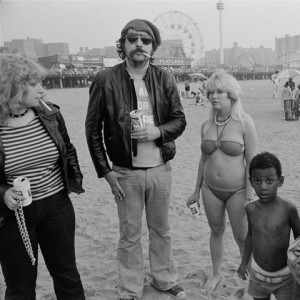 Soulless music was (nearly) as prevalent in Lester’s heyday as it is now, and he ripped plenty of artists a new blow-hole. But I would absolutely love to hear his take on today’s synthetic, auto-tuned music and the artists who get more press for wearing cupcake bras and marrying Kardashians than generating music. Can’t you just imagine him going toe-to-toe (or tongue-to-tongue) with Miley Cyrus in an interview. Opening question: “So, little Hannah Montana, which brand of vibrator do you use while composing your songs?” And, without blinking an eye, she’d tell him. You know she would.
Soulless music was (nearly) as prevalent in Lester’s heyday as it is now, and he ripped plenty of artists a new blow-hole. But I would absolutely love to hear his take on today’s synthetic, auto-tuned music and the artists who get more press for wearing cupcake bras and marrying Kardashians than generating music. Can’t you just imagine him going toe-to-toe (or tongue-to-tongue) with Miley Cyrus in an interview. Opening question: “So, little Hannah Montana, which brand of vibrator do you use while composing your songs?” And, without blinking an eye, she’d tell him. You know she would.
To get a sampling of his brilliance, read “Psychotic Reactions and Carburetor Dung,” a collection of his essays. And, for a great bio of Lester, check out “Let it Blurt: The Life and Times of Lester Bangs,” by Jim Derogatis.
Here’s a look at the late Leslie Conway Bangs. By the way, the late Philip Seymour Hoffman portrayed him in the film “Almost Famous.” Hoffman died in much the same way as Lester; though his drug of choice was heroin.
© Dana Spiardi, April 30, 2015
]]>